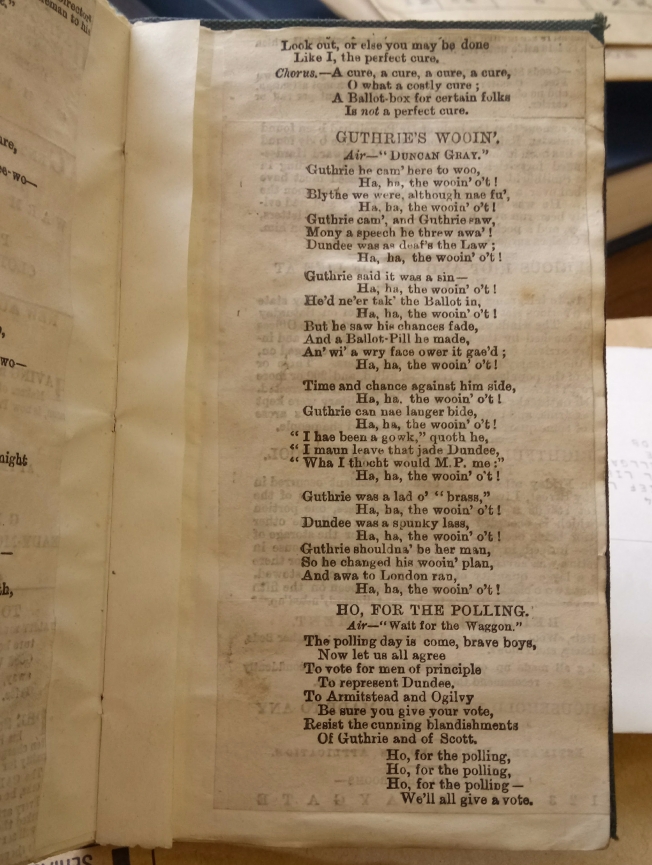Elections in 19th century Scotland inspired many poems and songs – some celebratory, and some satirical. These were part of a wider popular political verse tradition which dealt with the extension of the voting franchise, land reform, and workers’ rights, and often engaged with inter/national political issues from a local standpoint. They could be printed in magazines and newspapers, handed out on the streets, and recited at meetings and demonstrations.
My next few blogs – as we approach the Scottish Council Elections on May 4 and the UK General Election on June 8 – will look at a selection of Dundee’s political poems and songs from the 19th century. Today’s song, “Guthrie’s Wooin'”, mocks an unpopular politician to a folk tune. It is one of several political songs from the late 1860s cut and pasted in a little scrapbook. (Dundee Central Library: Lamb Collection 433/12)

The song was written shortly after the General Election of 1868 – the first in which Dundee elected two M.P.s instead of one, and in which the electorate had been greatly expanded following the 1867 Reform Act. In Dundee, these changes had been agitated for by a range of organisations, including the Dundee branch of the Scottish National Reform League (SNRL), who advocated extending the vote to all men of fixed address (the most radical position of all Dundee’s political groups at the time.)
Guthrie’s Wooin’
Air- Duncan Grey
Guthrie he cam here to woo
Ha, ha, the wooin’ o’t!
Blythe we were, although nae fu’
Ha, ha, the wooin’ o’t!
Guthrie cam’, and Guthrie saw,
Mony a speech he threw awa’!
Dundee was as deaf’s the Law!
Ha, ha, the wooin’ o’t!
Guthrie said it was a sin –
Ha, ha, the wooin’ o’t!
He’d ne’er tak the Ballot in,
Ha, ha, the wooin’ o’t!
But he saw his chances fade
And a Ballot-Pill he made,
An’ wi’ a wry face ower it gae’d;
Ha, ha, the wooin’ o’t!
Time an’ chance against him side,
Ha, ha, the wooin’ o’t!
Guthrie can nae longer bide,
Ha, ha, the wooin’ o’t!
“I hae been a gowk, quoth he,
“I maun leave that jaud Dundee,
“Wha I thocht wad MP me:”
Ha, ha, the wooin’ o’t!
Guthrie was a lad o’ “brass,”
Ha, ha, the wooin’ o’t!
Dundee was a spunky lass,
Ha, ha, the wooin’ o’t!
Guthrie shouldna’ be her man,
So he changed his wooin’ plan
And awa to London ran,
Ha, ha, the wooin’ o’t!
J.A. Guthrie, the unfortunate candidate immortalised in this song, stood as one of four Liberal candidates contesting the 1868 election. (At this time, UK elections were very much an either/or choice, and the Tories seem not to have thought it worth their time and money standing a candidate in Dundee that year…) He proved himself unpopular when a question-and-answer session revealed him to have much less liberal views on voting extension, and some other matters, than many hoped for. This revelation also led to embarrassment for the Dundee SNRL when their branch secretary endorsed him anyway – politics, t’was ever thus. He was rejected at the ballot box (and the SNRL branch secretary resigned.)
The song has Guthrie as a rejected suitor of Dundee (and without the happy ending the suitor in the song eventually gets.) The city portrayed as a woman approached by various wooers is a recurring theme in election poetry in Victorian Dundee, and likely further afield – a smaller version, perhaps, of the popular depictions of countries as women (think Britannia, or France’s Marianne.) There is an irony to this, given that the actual female population of Dundee were still many years away from being able to have their say in rejecting or accepting political candidates.
The song this is based on, “Duncan Grey”, was originally an explicit bawdy folk song written and/or collected by Robert Burns. He also wrote a version more suitable for polite company, but safe to say, the use of a tune with such rude connotations did not imply respect for its subject. Using existing tunes and song structures, which readers and listeners could immediately recognise, also allowed a writer to communicate their position on a topic immediately. Songs best known for sexual connotations – like this, or “The Miller O Don” – are used to strip the dignity from a political subject, while “A Man’s A Man For A’ That” would be used to celebrate and inspire. Burns’ work, to Victorian Scotland, was the ideal not only of working class poetry, but also of political poetry and poetry in Scots, and his influence is strong and widespread. The third line –“Blythe we were, although nae fu’” – is an interesting contrast to Burns’ “Ae blythe Yule-nicht when we were fu’.” The temperance movement was a strong political force in Dundee throughout the 19th, and well into the 20th century, and the songwriter is keen to emphasise that Dundee makes its political decisions while fully sober and sensible.
These songs about specific local events – while often requiring a bit of work to contextualise – are a fascinating window onto how traditional tunes were used to signal meaning and tone while dealing with contemporary events, and how important local political events were to the history of wider movements such as franchise reform. Stay tuned for more Dundonian political history over the coming weeks…
